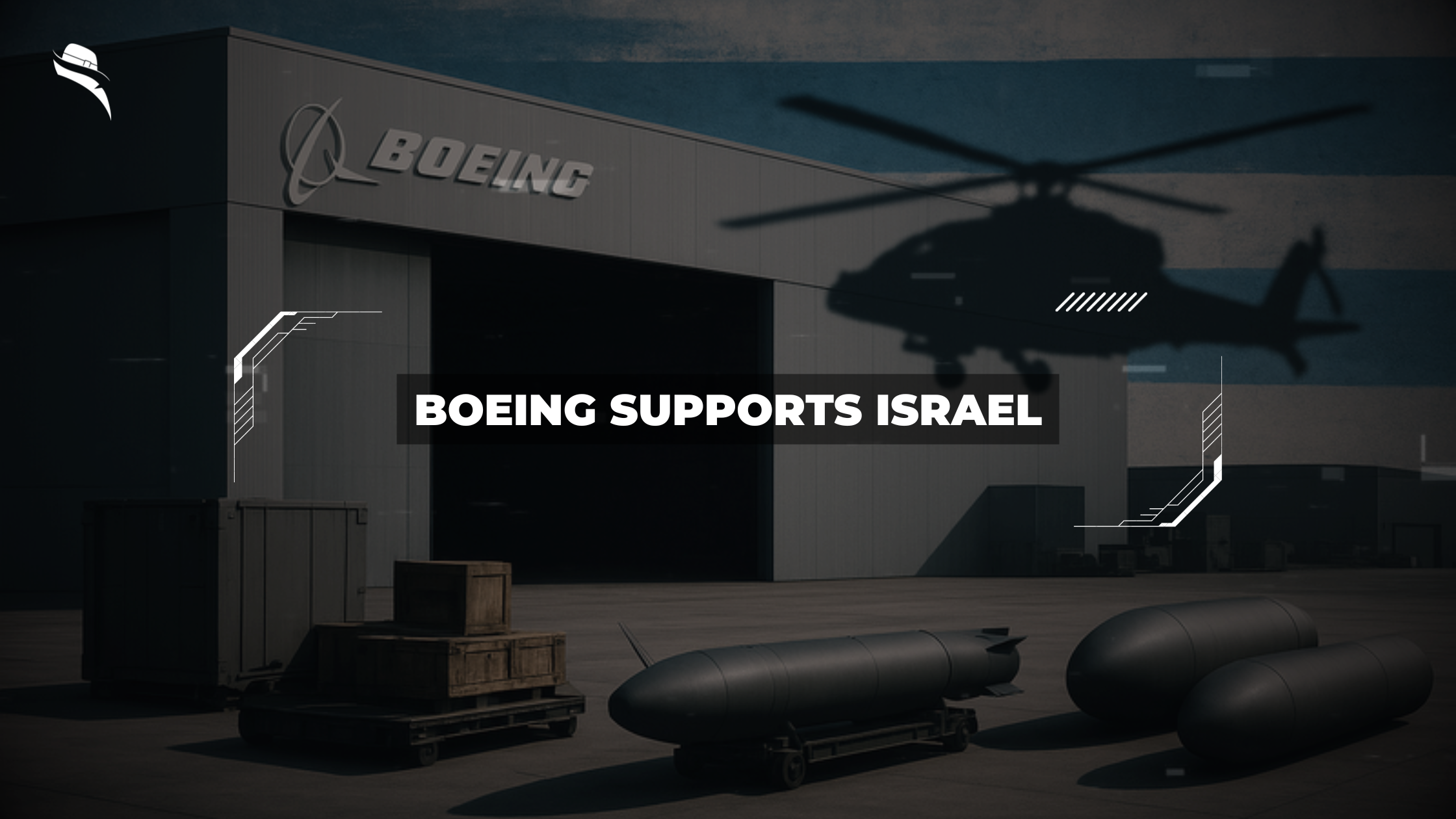Boeing supports Israel with an unprecedented volume of weaponry that has significantly impacted the Gaza conflict since October 2023. According to available data, Boeing manufactured the majority of guided bombs and munitions delivered to Israel by any U.S. company from 2021 to 2023.
In fact, the scale is staggering—nearly 3,000 Boeing GBU-39 Small Diameter Bombs and an estimated 3,000 Boeing Joint Direct Attack Munitions (JDAMs) were delivered to Israel during this period. This support is part of a larger pattern, as the United States has delivered more than 10,000 tons of weapons in 244 cargo planes and 20 ships to Israel since October 2023, with the U.S. accounting for 69% of Israel’s arms imports.
This article examines the extensive military relationship between Boeing and Israel, focusing specifically on the company’s provision of Apache helicopters, JDAM conversion kits, and bomb deliveries. Furthermore, we’ll explore how these weapons have been deployed in Gaza, the resulting humanitarian impact, and the growing public response to Boeing’s role in the conflict.
Boeing’s Military Ties with Israel: A Longstanding Alliance
The relationship between Boeing and Israel extends back decades, establishing one of the most substantial defense partnerships in the Middle East region. Unlike many contemporary arms deals, this alliance has evolved through changing geopolitical landscapes and multiple conflicts.
How Boeing became a key defense partner
Boeing’s relationship with Israel began to solidify in the 1970s when Israel shifted from primarily European suppliers to American defense contractors. This transition occurred as Israel sought more advanced military technologies following the 1973 Yom Kippur War. The partnership deepened throughout the 1980s and 1990s as Boeing began supplying critical military aircraft and weapons systems.
The turning point came when Boeing delivered the first Apache attack helicopters to Israel, establishing the company as a premier defense partner. These helicopters quickly became essential components of Israel’s military strategy, especially in asymmetric warfare scenarios. Additionally, Boeing’s acquisition of McDonnell Douglas in 1997 further expanded its defense portfolio available to Israel.
Beyond aircraft, Boeing gradually became Israel’s primary supplier of precision guidance systems. The company’s JDAM (Joint Direct Attack Munition) kits particularly transformed Israel’s aerial capabilities, allowing standard unguided bombs to become precision-guided weapons. This technology proved crucial for Israel’s military operations in densely populated areas where precision was paramount.
The partnership also fostered technological cooperation. Israeli innovations have occasionally been incorporated into Boeing products, creating a two-way relationship that strengthened military and industrial ties between the nations. Moreover, Boeing established offices in Israel to facilitate closer coordination on defense projects and maintenance support.
Overview of U.S. military aid to Israel
Boeing’s support for Israel exists within the broader framework of U.S. military aid to the country. The United States provides Israel approximately $3.8 billion annually in military assistance, making Israel the largest cumulative recipient of U.S. foreign assistance since World War II.
Under this arrangement, Israel must spend about 75% of this aid on U.S.-made weapons, creating a structured pipeline for defense contractors like Boeing. Consequently, this requirement ensures Boeing maintains a privileged position as a supplier to Israel’s military.
The military aid structure has evolved over time. Previously, Israel could spend a portion of U.S. aid on its domestic defense industry. However, the most recent ten-year Memorandum of Understanding (2016-2026) gradually eliminated this provision, directing more funds toward American manufacturers such as Boeing.
Through successive administrations, U.S. policy has maintained this substantial military aid package, citing shared strategic interests and Israel’s security challenges. Nevertheless, the relationship occasionally faces scrutiny, particularly when weapons are deployed in conflicts that result in civilian casualties.
Boeing’s position within this aid structure has grown increasingly central, as the company produces many of the high-value systems Israel prioritizes in its military acquisitions—from aircraft to precision weaponry. This explains why Boeing has become such a dominant force in supplying Israel’s defense needs over time.
Apache Helicopters: Boeing’s Airborne Arsenal
Among Boeing’s most notable contributions to Israel’s military arsenal stands the formidable Apache attack helicopter, a versatile weapons platform that has become emblematic of Israel’s aerial dominance in the region.
Apache AH-64: Capabilities and deployment
The AH-64 Apache represents the pinnacle of attack helicopter design, equipped with an impressive array of weaponry, including Hellfire missiles, 70mm rockets, and a 30mm chain gun. These combat helicopters offer Israeli forces exceptional battlefield versatility through their night-vision capabilities, advanced targeting systems, and ability to operate in diverse weather conditions.
Israel first received AH-64A models in the early 1990s, eventually upgrading to the more advanced AH-64D Longbow variant. These helicopters serve as the backbone of Israel’s rotary attack fleet, providing crucial close air support and anti-armor capabilities. Their relatively compact size compared to fixed-wing aircraft allows for deployment in confined spaces while maintaining substantial firepower.
Use in Gaza and West Bank operations
Throughout recent conflicts, Apache helicopters have played an instrumental role in Israel’s military operations across Gaza and the West Bank. Their ability to hover while delivering precision strikes makes them particularly effective in urban environments where conventional bombing runs might pose greater risks of collateral damage.
The Israeli Air Force routinely deploys these helicopters for both reconnaissance and combat missions. In Gaza specifically, Apaches conduct targeted operations against what Israel identifies as militant positions, weapon storage facilities, and tunnel networks. Their maneuverability enables them to provide immediate air support for ground troops engaged in combat operations.
Controversies around targeted killings
Despite their tactical advantages, the use of Apache helicopters in densely populated areas has drawn substantial criticism from human rights organizations. Critics point to incidents where Apache strikes resulted in civilian casualties, raising questions about proportionality and distinction under international humanitarian law.
The helicopter’s deployment in “targeted killing” operations—where specific individuals are identified and eliminated—remains especially contentious. These operations blur the lines between law enforcement and armed conflict paradigms, often occurring in areas where civilian presence is unavoidable.
Additionally, the psychological impact of Apache helicopters cannot be overlooked. The distinctive sound of their rotors has become associated with imminent strikes, creating profound anxiety among civilian populations in conflict zones where these aircraft operate regularly.
JDAM Kits: Turning Dumb Bombs into Smart Weapons
At the core of modern precision warfare lies a deceptively simple technology: the Joint Direct Attack Munition (JDAM) kit. This Boeing-manufactured system fundamentally alters the capabilities of conventional weaponry in the Israeli arsenal.
What are JDAM kits?
JDAM kits represent a cost-effective solution that converts conventional unguided free-fall bombs—often called “dumb bombs”—into precision-guided “smart” munitions. Essentially, these kits add a new tail section containing an Inertial Navigation System (INS) and Global Positioning System (GPS) receiver to existing bombs. The system includes aerodynamic control surfaces and a set of four aerofoil strakes along the bomb bodies that provide lift and additional glide range.
These conversion kits can be attached to various bomb types:
- 500-pound (MK-82, BLU-111, BLU-126) bombs
- 1,000-pound (MK-83, BLU-110) bombs
- 2,000-pound (MK-84, BLU-109, BLU-117) “bunker buster” bombs
Once equipped with a JDAM kit, the bomb receives a new designation as a Guided Bomb Unit (GBU), superseding its original nomenclature.
How do they enhance precision bombing?
Before JDAM technology, precision-guided weapons relied primarily on seekers using infrared, visual light, or reflected laser spots to locate targets—methods severely limited by weather conditions. In contrast, JDAM’s GPS/INS guidance system functions effectively regardless of rain, clouds, fog, smoke, or artificial obscurants.
The navigation system initializes through transfer alignment from the aircraft, providing position and velocity vectors. After release, the weapon navigates autonomously to designated target coordinates. In its most accurate mode with available GPS data, JDAM achieves a circular error probable (CEP) of 5 meters or less. Even if GPS signals are jammed or lost, the system maintains an accuracy of 30 meters CEP for free flight times up to 100 seconds.
Beyond mere accuracy, JDAM allows complete customization of flight trajectories to meet specific criteria. This enables impacts at precise headings and vertical angles—maximizing penetration, optimizing warhead effectiveness, or approaching from different directions than the launch aircraft to reduce detection risk.
Instances of JDAM use in Gaza
Amnesty International investigations confirmed U.S.-made JDAM kits were used by the Israeli military in two deadly air strikes on homes in Gaza, killing 43 civilians, including 19 children, 14 women, and 10 men. Distinctive fragments recovered from the rubble showed the characteristic rivets and harness system of JDAM frames, with code 70P862352 stamped on plates from both incidents, directly linking them to Boeing.
The bombs employed in these strikes were substantial—a likely 2,000-pound bomb struck the al-Najjar family home, and at least a 1,000-pound bomb hit the Abu Mu’eileq family residence. Manufacturing codes on the recovered fragments indicated the JDAMs were produced in 2017 and 2018, respectively.
A CNN analysis reported Israel dropped more than 500 2,000-pound bombs in Northern Gaza until November 6, 2023, including a November 1 bombing of Jabalia refugee camp that killed hundreds of civilians and potentially constituted a war crime according to the UN High Commissioner for Human Rights.
Bomb Deliveries and Their Impact on Gaza
The raw statistical data reveal a staggering scale of Boeing weaponry delivered to Gaza through Israel. This flow of munitions has resulted in unprecedented civilian suffering, raising serious international legal questions.
Types of bombs supplied by Boeing
In the immediate aftermath of October 2023, Boeing expedited delivery of 1,000 250-pound bombs and 1,800 GPS-guidance bomb kits to Israel, part of a $735 million commercial sale. Altogether, from 2021 through 2023, the U.S. delivered approximately 5,214 missiles to Israel—nearly 3,000 of which were Boeing’s GBU-39 Small Diameter Bombs. Correspondingly, an estimated 3,000 Boeing Joint Direct Attack Munitions (JDAMs) were shipped during this timeframe. Between October and December 2021, the U.S. reportedly sent Israel more than 5,000 MK-84 bombs.
Civilian casualties and infrastructure damage
The World Bank and United Nations report damage to Gaza’s critical infrastructure at approximately $18.50 billion, equivalent to 97% of the combined West Bank and Gaza GDP in 2022. Housing accounts for 72% of damage costs, public service infrastructure 19%, and commercial buildings 9%. The human toll is equally devastating: more than 75% of Gaza’s population is displaced, with over a million people homeless. Moreover, 84% of health facilities are damaged or destroyed, water systems operate at less than 5% capacity, and 100% of children are out of school. Indeed, 92% of primary roads lie destroyed or damaged.
International law and war crime allegations
Amnesty International investigations confirmed Boeing-manufactured JDAMs were used in two specific airstrikes on civilian homes in Gaza, killing 43 civilians, including 19 children. The UN Human Rights Office verified 218 deaths from just six emblematic attacks involving GBU bombs. Subsequently, UN experts warned that companies supplying weapons to Israel “risk being complicit in serious violations of international human rights and international humanitarian laws”. A UN report explicitly states that using explosive weapons with wide-area effects in densely populated areas likely constitutes a prohibited indiscriminate attack.
Public and Political Response to Boeing’s Role
Mounting opposition to Boeing’s involvement in the Israel-Gaza conflict has emerged across university campuses, political circles, and civil society organizations. This backlash represents a significant challenge to the aerospace giant’s military contracts and public image.
Student and activist protests
Campus demonstrations against Boeing’s weapons supplies to Israel have intensified nationwide. Students at MIT staged a “die-in” at a Boeing recruitment event, forcing its cancellation. Similarly, Columbia University protesters disrupted Boeing’s career fair, demanding the university cut ties with the company. At Northwestern University, students blocked Boeing recruiters from campus, chanting “Boeing, Boeing, you can’t hide, we won’t help you commit genocide.”
Beyond campuses, direct actions have targeted Boeing facilities. Activists blocked entrances to Boeing’s weapons manufacturing plant in St. Charles, Missouri, while others demonstrated at the company’s headquarters in Arlington, Virginia. These protests explicitly connect Boeing’s weapons to civilian casualties in Gaza.
U.S. government’s stance and arms deals
The Biden administration has maintained unwavering support for arms transfers to Israel despite growing criticism. In April 2024, the State Department approved a $20 billion weapons package for Israel, including Boeing-manufactured bombs and helicopters. Notably, President Biden circumvented congressional review for one shipment of 2,000-pound bombs through an emergency declaration.
Internal dissent has nonetheless surfaced within government ranks. State Department officials filed dissent cables, and some staff members resigned in protest over continued weapons transfers. Still, these internal objections have not altered the administration’s policy of supplying Boeing and other manufacturers’ weapons to Israel.
Calls for divestment and accountability
Financial pressure on Boeing has mounted through divestment campaigns. The Norwegian sovereign wealth fund—the world’s largest—placed Boeing under observation due to weapons sales to Israel. Faith-based investors filed shareholder resolutions demanding that Boeing assess the human rights impacts of its weapons sales.
Legal challenges have simultaneously emerged. Human rights organizations filed a lawsuit in California seeking to halt Boeing’s weapons deliveries to Israel. Additionally, legal experts have argued Boeing could face liability under international law for complicity in war crimes if its weapons are used in indiscriminate attacks on civilians.
Companies like Boeing are complicit in war crimes and humanitarian crises. Learn more about other weapon manufacturers fueling global conflict and why boycotting their shares is a stand for justice and ethical living.
Final Thoughts
The ethical dimensions of Boeing’s weapons sales to Israel extend beyond the immediate conflict. As a major defense contractor, Boeing’s decisions shape global standards for corporate responsibility in conflict zones. The company faces a fundamental tension between shareholder obligations and humanitarian concerns that other arms manufacturers likewise confront.
Ultimately, Boeing’s continued weapons deliveries to Israel highlight the complex interplay between commercial interests, geopolitical alliances, and international humanitarian law. Although Boeing maintains that these sales comply with legal requirements, growing evidence suggests that its products have been used in attacks affecting civilian populations.
This situation raises profound questions about accountability mechanisms within the global arms trade. Currently, defense contractors operate primarily under national regulations rather than international oversight, creating significant gaps in responsibility chains between weapons manufacturers and their battlefield deployment.
Meanwhile, the heightened visibility of Boeing’s role reflects a broader shift in public consciousness. Traditional separations between corporate actions and their consequences in distant conflicts have eroded in an era of immediate information sharing. Defense contractors now face unprecedented scrutiny from investors, consumers, and civil society.
Boeing’s position thus serves as a test case for how weapons manufacturers navigate increasing demands for ethical consideration alongside their business imperatives. These tensions will likely intensify rather than diminish in future conflicts.
FAQs
1. How does Boeing support Israel?
Boeing supports Israel by supplying a wide range of military equipment, including Apache helicopters, JDAM kits, and precision-guided bombs. The company has delivered thousands of munitions to Israel, forming a significant part of U.S. military aid to the country.
2. What specific weapons has Boeing provided to Israel?
Boeing has delivered nearly 3,000 GBU-39 Small Diameter Bombs, approximately 3,000 JDAMs (Joint Direct Attack Munitions), and Apache AH-64 helicopters. These weapons have been used in various operations, including in Gaza and the West Bank.
3. How long has Boeing been a defense partner of Israel?
Boeing’s partnership with Israel dates back to the 1970s, evolving through decades of military collaboration. The company became a key supplier of advanced aircraft, helicopters, and precision-guided munitions, cementing its role as a major defense contractor for Israel.
4. What is the impact of Boeing’s weapons on Gaza?
The weapons supplied by Boeing have been linked to significant civilian casualties and infrastructure damage in Gaza. Investigations by Amnesty International and UN agencies have confirmed the use of JDAMs and other Boeing munitions in strikes that killed civilians, including children.
5. How does U.S. military aid to Israel relate to Boeing’s role?
The U.S. provides Israel with approximately $3.8 billion annually in military aid. About 75% of this aid must be spent on U.S.-made weapons, which ensures companies like Boeing remain primary suppliers for Israel’s defense needs.
6. Has there been public backlash against Boeing supporting Israel?
Yes. Activists, students, and human rights organizations have protested Boeing’s arms sales to Israel, highlighting civilian casualties in Gaza. Some investors, including Norway’s sovereign wealth fund, have also scrutinized Boeing over ethical concerns.
7. Could Boeing face legal or ethical accountability?
Boeing may face scrutiny under international humanitarian law if its weapons are used in indiscriminate attacks against civilians. Lawsuits and divestment campaigns have called for greater corporate responsibility regarding its role in the Israel-Gaza conflict.
8. Why is Boeing’s support for Israel significant?
Boeing supports Israel in a way that influences both military strategy and global arms trade ethics. The company’s role highlights tensions between corporate interests, geopolitical alliances, and humanitarian accountability, making it a focal point in discussions about the ethics of defense contracting.







1 Comment